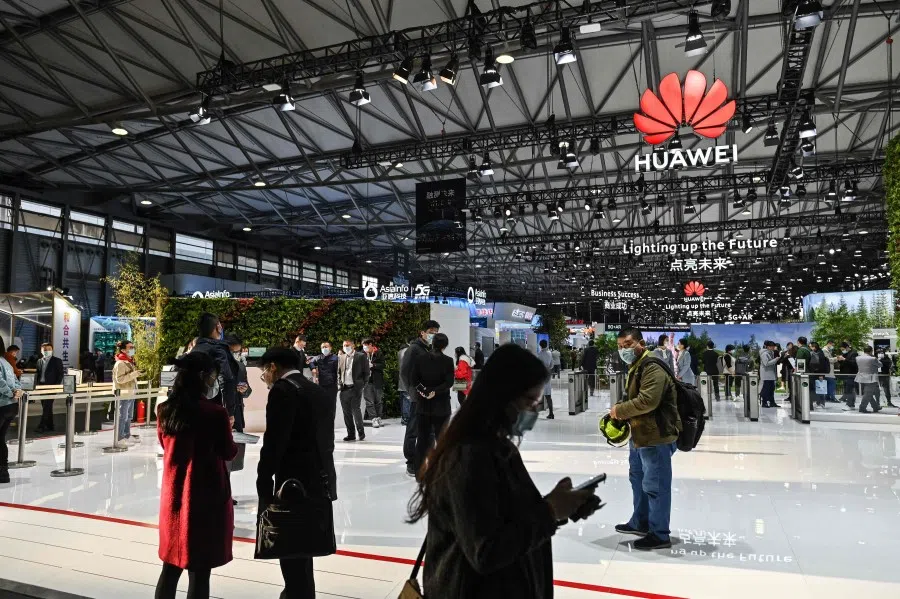Grievances against the US? The Chinese need a mindset change
Wang Chong observes that many Chinese are afflicted with a victim mentality and a chip on their shoulder. This colours their view of US-China relations and worsens the spiral of negativity. Rather than perpetuate self-fulfilling prophecies, maybe it is time that the Chinese look at their own weaknesses squarely and tackle them. At the end of the day, it is not about who wins, but who becomes their better self.

I recently participated in a few seminars on China-US relations. I detected a sense of grievous hurt in the words of some of the attendees.
This sense of feeling aggrieved is not the autumnal moodiness that the literati experience or the emotions that well up when poets encounter certain landscapes. Rather, the words used by the speakers reveal their victim mentality and the chip they have on their shoulder. More specifically, their frequent mention of the US's "unreasonable oppression of China", "containment of China", "wild ambition to subjugate China", and the idea that "war will break out" between China and the US shows clearly their thesis statement that the US is always bullying China.
China's chip on the shoulder
Having a victim mentality is a legacy of China's modern history. Chinese history textbooks tell us that China has always been bullied by the West since the Opium Wars. After 1949, China and the US became enemies; the newspapers at that time were filled with reports and stories of how China was being bullied and humiliated by American imperialism. Over time, these words and historical incidents have been firmly etched in people's minds, and become bone-deep emotions. Hence, when discussing current China-US relations, there would typically be an overflow of these words and emotions.
Having a chip on one's shoulder is the bedfellow of a victim mentality. Because of all the bullying one experienced in the modern era, one always thinks of himself as being in a disadvantaged position and is extremely sensitive about what people say or do, thinking that the other party is provoking an attack. Take for example a rich man and a poor man. The rich man is not afraid of being called "poor", but the poor man is most afraid of that. This is the case with human mentality sometimes.

Having a victim mentality and a chip on one's shoulder result in feeling aggrieved, making one lose his sense of rationality and become ruled by emotions instead. When that happens, issues that could have been logically and calmly discussed become heated quarrels over time, and one starts lashing out at the other party or even spewing vulgarities at them.
Of course, these are the sentiments of some people, not all of them. But these feelings are extremely common among regular citizens, and are also shared by a small number of academics and media professionals. Apart from venting one's frustrations and releasing some steam, discussing problems with such a mindset does not help to solve the problem.
What is needed is really a change in mindset towards the US. The Chinese are rising and standing up, but they have not built up the confidence deep inside...
A sense of feeling aggrieved can be seen in various fields across China. For example, a team from a multinational company was climbing the Great Wall of China one time. When they reached the halfway mark (10km) of the distance they wanted to cover, Chinese employees lamented that they still had half the journey to complete. But American employees were happy with their progress, saying that they had already completed half the journey. So, the same problem viewed from different perspectives results in completely different attitudes and experiences. Actually, China-US competition can also be interpreted in this way: a country so weak in the past is now able to wrestle and compete with the world's top power; how proud should they be of how far they have come!
A mindset change is needed
What is needed is really a change in mindset towards the US. The Chinese are rising and standing up, but they have not built up the confidence deep inside, which calls for letting go of the victim complex and looking at the China-US competition rationally and objectively.
First, it is a competition, and not a case of one party "bullying" the other. Whether between people, organisations, or countries, competition is normal. And this competition between China and the US may be long-drawn and wide-reaching - it is an all-out competition, but not one to the death.

Between two big countries, neither side can eat the other up; neither side has territorial ambitions over the other; neither side wants to destroy the other. That is the basic fact. While there is a risk of a spark setting things off in some regions such as the South China Sea and the Taiwan Strait, the situation is generally under control as long as both sides are willing.
Second, competition sometimes escalates, which is also inevitable. Competition is sometimes cruel, as in a boxing match where opponents go for weak spots, such as a facial injury. This is also true of countries, where each looks for others' weak points and uses them to gain an advantage.
Look problems squarely in the face
At such times, it is no use getting angry, complaining, or feeling the other side is not fair. The only thing you can do is to shore up your own weak points. For example, the US not selling chips to Huawei sparked the victim complex in China and many people started buying Huawei phones to support the brand. But this does not solve the problem; the only solution is to produce one's own chips.
... the final result of this competition is not about who wins, but who becomes the better self.
Third, things cannot be rushed. This might be a long competition. This tussle between China and the US may look like a boxing match, but it is in fact more like a marathon, where the result depends on who has the better stamina, whose choice of route is more advantageous, who has more supplies along the way, and who has more supporters cheering them on. When it comes to that, a recent session by China's foreign ministry put it quite well - the world of the future should not and cannot allow China to become like the US, but the US and China should each be better versions of themselves.
Indeed, the final result of this competition is not about who wins, but who becomes the better self. This reminds me of a line from Joseph Nye: no one in the world can defeat China except itself. This line applies to China as well as the US.



![[Big read] When the Arctic opens, what happens to Singapore?](https://cassette.sphdigital.com.sg/image/thinkchina/da65edebca34645c711c55e83e9877109b3c53847ebb1305573974651df1d13a)
![[Video] George Yeo: America’s deep pain — and why China won’t colonise](https://cassette.sphdigital.com.sg/image/thinkchina/15083e45d96c12390bdea6af2daf19fd9fcd875aa44a0f92796f34e3dad561cc)
